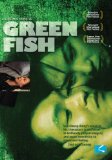| Reviews & Columns |
|
Reviews DVD TV on DVD Blu-ray 4K UHD International DVDs In Theaters Reviews by Studio Video Games Features Collector Series DVDs Easter Egg Database Interviews DVD Talk Radio Feature Articles Columns Anime Talk DVD Savant Horror DVDs The M.O.D. Squad Art House HD Talk Silent DVD
|
DVD Talk Forum |
|
|
| Resources |
|
DVD Price Search Customer Service #'s RCE Info Links |
|
Columns
|
|
|
Green Fish
Pathfinder Home Entertainment // Unrated // November 24, 2009
List Price: $24.98 [Buy now and save at Amazon]
The Film:
Like most freshman attempts from great directors, it's easy to see Lee Chang-dong's talent stirring in Green Fish (Chorok mulkogi). Most might have experienced his work first through Oasis or, like myself, through the poignant politico critique Peppermint Candy, each one cradling its oftentimes symbolic characters with both heartfelt passion and an unabashed compulsion to drag them through trials and tribulations. Such similarities can be seen in his first film in the director's chair, a picture that empathizes with almost every single character -- gangster and family members alike -- in telling an allegorical rise-and-fall tale of a blameless person turn corrupt. Green Fish certainly isn't Lee Chang-dong's best, but it makes up for a loosely-noosed sense of gravity with raw sentiment.
We're introduced to Makdong (Han Suk-Kyu, Shiri), a recently released soldier from the army on the train ride home. Along the way, he encounters a beautiful woman sticking her head out of the train at the same time as him, accidently releasing her pink scarf to swirl in the wind to smack him in the face. He's smitten, to such a degree that he attempts to defend her honor against several hoodlums on the train, even though he can't fight. Perhaps that's the reason for his release? We're not told exactly what happened to Makdong in the army, but it's clear that he didn't earn very much gusto, strength, or sense of self-defense, since he's beaten up several times early in his story.
That's before the woman he's infatuated with, a drugged-up, staggering girl who's numb to life, hooks him up with her overlord boyfriend for an entry-level job as a parking attendant, a position that eventually turns into his way in as a "little brother" within his clan. Lee Chang-dong's plot devices aren't original from this point forward -- how many times have we heard the story about the young gangster who falls in love with the boss's arm candy? -- but he reveals them with a grasp on emotion that's impressive. Makdong cares for his rather large family, and wants nothing more than to start a restaurant with them. To do that, he needs money. However, he also needs a sense of purpose for his own life, which leads to his breakneck ascendance as a gangster under the empathetic lead of his "Big Brother". The boss identifies with Makdong, because they come from the same background: poor, yet driven.
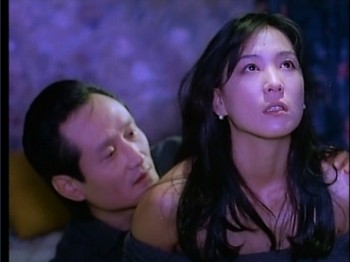 Green Fish marks an important benchmark in Korean cinema, as it operates as both a catalyst to a deep side of the Korean New Wave slate of cinema and as the firecracker underneath Lee Chang-dong's feet to craft a vast body of politically resonant pictures. It's one of the earliest non-government funded pictures from the region to receive high critical acclaim, garnering attention at both the Vancouver and Rotterdam film festivals, as well as giving a few stars their start: Han Suk-Kyu would go on to star in Shiri and a few other productions, while Song Kang-ho of Memories of Murder and Thirst fame plays a secondary yet important role. It's more important as a relic or a blueprint, sure, but that shouldn't detract from the picture's punchy meaningfulness as a testament to familial love and making the most of what you're given.
Green Fish marks an important benchmark in Korean cinema, as it operates as both a catalyst to a deep side of the Korean New Wave slate of cinema and as the firecracker underneath Lee Chang-dong's feet to craft a vast body of politically resonant pictures. It's one of the earliest non-government funded pictures from the region to receive high critical acclaim, garnering attention at both the Vancouver and Rotterdam film festivals, as well as giving a few stars their start: Han Suk-Kyu would go on to star in Shiri and a few other productions, while Song Kang-ho of Memories of Murder and Thirst fame plays a secondary yet important role. It's more important as a relic or a blueprint, sure, but that shouldn't detract from the picture's punchy meaningfulness as a testament to familial love and making the most of what you're given.
Both visually and tonally, Green Fish works on the same rhythm as Lee Chang-dong's far superior film Peppermint Candy. The similarities between the two main characters are eerily similar, but Green Fish takes a more traditional approach by telling its lengthy yarn in a linear fashion. They both, however, capture the corruption of a once-innocent soldier who's brought down by life's complications, two men fueled by love and determination. It's as if Chang-dong saw the potential for a political allegory in a similar, non-gangster picture in Green Fish's structure and decided to give it another go. Still, Makdong's story is convincing because of his peculiar family, his understanding with his boss, and the peculiar blossoming relationship between him and the boss's girlfriend -- which transforms into an odd, lukewarm romantic aside to the tale.
It has uneven moments, especially approaching its oddly-meddling conclusion, but the characters and core emotional drive make up for its shortcomings. Most importantly, Green Fish is drenched in themes that revolve around desperation and power. Makdong's growing willingness to throw himself in harm's way as he transforms into a man becomes a clear one, as well as the portrait of a weak individual's inability to separate from danger when it's all they know. Lee Chang-dong has become a bit of a sociologically strapping mastermind when he plays with these themes in his later films, and they clearly root in his capacity to render them within an overplayed narrative here. Though overlong and dramatically malnourished in a fashion befitting a virginal effort, Green Fish still weighs in as a satisfyingly heartfelt and human portrait.
The DVD:
Video and Audio:
Unfortunately, those hoping for a quietly impressive edition of the film will be severly let down, as Green Fish is offered from Pathfinder Home Entertainment in a full-frame, ugly presentation. Having seen the native widescreen aspect ratio and the color difference in the film, it's staggering to see exactly how incorrect this image can be. Contrast issues, digitized garbling, and more print damage than you can shake a stick at plague this release, along with quite a bit of screen tearing and flickering. I suppose it's stable enough to get the gist of the visuals that Lee Chang-dong and his cinematographer had in mind, but it's a sore disappointment to see the level of problems that cripple it -- even when taking the aspect ratio discrepancy out of the equation. Not recommended in the slightest.
Fairing better, but not free of criticism by any stretch, the Korean 2.0 Stereo track preserves the dialogue and sound design to a degree that can be stomached. The dialogue pushes the higher quadrants of the sound design and distorts a bit, while sound effects like the slamming of a wood plank are uninspired. However, it's more stable than the image, and pours the musical accompaniment through with enough of an evocative edge to be mildly successful. The English subtitles, however, are less impressive. Featuring grammatical errors and missing words, they're barely serviceable.
Special Features:
Aside from the Trailers for other Pathfinder DVDs, not including Green Fish, there's nothing but a Scene Selection.
Final Thoughts:
Lee Chang-dong's Green Fish is certainly worth seeing, if for nothing more than to see the roots of a great Korean director's talents in a symbolic, potent picture of growth and corruption. Pathfinder's DVD, however, isn't the right way to experience this film, as the cropped, unattractive image and lack of special features cripple the experience. Still, it's worth a Rental since it's the only way to see the film on North American, NTSC players; however, if you have either a PAL-capable DVD player or a multi-region machine, I highly suggest you locate either the Third Window Films' UK edition (anamorphic, 1.77:1) or another import copy of the picture.
Thomas Spurlin, Staff Reviewer -- DVDTalk Reviews | Personal Blog/Site
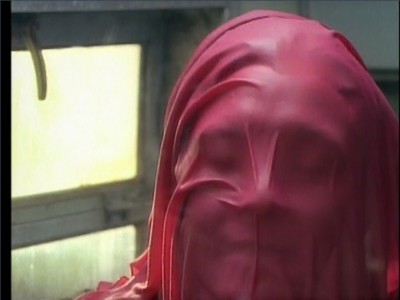 |
We're introduced to Makdong (Han Suk-Kyu, Shiri), a recently released soldier from the army on the train ride home. Along the way, he encounters a beautiful woman sticking her head out of the train at the same time as him, accidently releasing her pink scarf to swirl in the wind to smack him in the face. He's smitten, to such a degree that he attempts to defend her honor against several hoodlums on the train, even though he can't fight. Perhaps that's the reason for his release? We're not told exactly what happened to Makdong in the army, but it's clear that he didn't earn very much gusto, strength, or sense of self-defense, since he's beaten up several times early in his story.
That's before the woman he's infatuated with, a drugged-up, staggering girl who's numb to life, hooks him up with her overlord boyfriend for an entry-level job as a parking attendant, a position that eventually turns into his way in as a "little brother" within his clan. Lee Chang-dong's plot devices aren't original from this point forward -- how many times have we heard the story about the young gangster who falls in love with the boss's arm candy? -- but he reveals them with a grasp on emotion that's impressive. Makdong cares for his rather large family, and wants nothing more than to start a restaurant with them. To do that, he needs money. However, he also needs a sense of purpose for his own life, which leads to his breakneck ascendance as a gangster under the empathetic lead of his "Big Brother". The boss identifies with Makdong, because they come from the same background: poor, yet driven.
 Green Fish marks an important benchmark in Korean cinema, as it operates as both a catalyst to a deep side of the Korean New Wave slate of cinema and as the firecracker underneath Lee Chang-dong's feet to craft a vast body of politically resonant pictures. It's one of the earliest non-government funded pictures from the region to receive high critical acclaim, garnering attention at both the Vancouver and Rotterdam film festivals, as well as giving a few stars their start: Han Suk-Kyu would go on to star in Shiri and a few other productions, while Song Kang-ho of Memories of Murder and Thirst fame plays a secondary yet important role. It's more important as a relic or a blueprint, sure, but that shouldn't detract from the picture's punchy meaningfulness as a testament to familial love and making the most of what you're given.
Green Fish marks an important benchmark in Korean cinema, as it operates as both a catalyst to a deep side of the Korean New Wave slate of cinema and as the firecracker underneath Lee Chang-dong's feet to craft a vast body of politically resonant pictures. It's one of the earliest non-government funded pictures from the region to receive high critical acclaim, garnering attention at both the Vancouver and Rotterdam film festivals, as well as giving a few stars their start: Han Suk-Kyu would go on to star in Shiri and a few other productions, while Song Kang-ho of Memories of Murder and Thirst fame plays a secondary yet important role. It's more important as a relic or a blueprint, sure, but that shouldn't detract from the picture's punchy meaningfulness as a testament to familial love and making the most of what you're given. Both visually and tonally, Green Fish works on the same rhythm as Lee Chang-dong's far superior film Peppermint Candy. The similarities between the two main characters are eerily similar, but Green Fish takes a more traditional approach by telling its lengthy yarn in a linear fashion. They both, however, capture the corruption of a once-innocent soldier who's brought down by life's complications, two men fueled by love and determination. It's as if Chang-dong saw the potential for a political allegory in a similar, non-gangster picture in Green Fish's structure and decided to give it another go. Still, Makdong's story is convincing because of his peculiar family, his understanding with his boss, and the peculiar blossoming relationship between him and the boss's girlfriend -- which transforms into an odd, lukewarm romantic aside to the tale.
It has uneven moments, especially approaching its oddly-meddling conclusion, but the characters and core emotional drive make up for its shortcomings. Most importantly, Green Fish is drenched in themes that revolve around desperation and power. Makdong's growing willingness to throw himself in harm's way as he transforms into a man becomes a clear one, as well as the portrait of a weak individual's inability to separate from danger when it's all they know. Lee Chang-dong has become a bit of a sociologically strapping mastermind when he plays with these themes in his later films, and they clearly root in his capacity to render them within an overplayed narrative here. Though overlong and dramatically malnourished in a fashion befitting a virginal effort, Green Fish still weighs in as a satisfyingly heartfelt and human portrait.
The DVD:
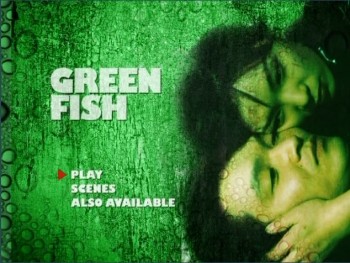 | 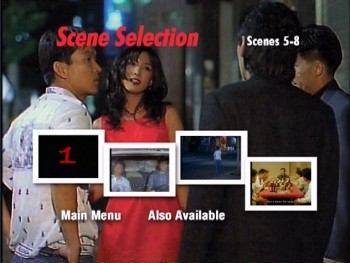 |
Video and Audio:
Unfortunately, those hoping for a quietly impressive edition of the film will be severly let down, as Green Fish is offered from Pathfinder Home Entertainment in a full-frame, ugly presentation. Having seen the native widescreen aspect ratio and the color difference in the film, it's staggering to see exactly how incorrect this image can be. Contrast issues, digitized garbling, and more print damage than you can shake a stick at plague this release, along with quite a bit of screen tearing and flickering. I suppose it's stable enough to get the gist of the visuals that Lee Chang-dong and his cinematographer had in mind, but it's a sore disappointment to see the level of problems that cripple it -- even when taking the aspect ratio discrepancy out of the equation. Not recommended in the slightest.
Fairing better, but not free of criticism by any stretch, the Korean 2.0 Stereo track preserves the dialogue and sound design to a degree that can be stomached. The dialogue pushes the higher quadrants of the sound design and distorts a bit, while sound effects like the slamming of a wood plank are uninspired. However, it's more stable than the image, and pours the musical accompaniment through with enough of an evocative edge to be mildly successful. The English subtitles, however, are less impressive. Featuring grammatical errors and missing words, they're barely serviceable.
Special Features:
Aside from the Trailers for other Pathfinder DVDs, not including Green Fish, there's nothing but a Scene Selection.
Final Thoughts:
Lee Chang-dong's Green Fish is certainly worth seeing, if for nothing more than to see the roots of a great Korean director's talents in a symbolic, potent picture of growth and corruption. Pathfinder's DVD, however, isn't the right way to experience this film, as the cropped, unattractive image and lack of special features cripple the experience. Still, it's worth a Rental since it's the only way to see the film on North American, NTSC players; however, if you have either a PAL-capable DVD player or a multi-region machine, I highly suggest you locate either the Third Window Films' UK edition (anamorphic, 1.77:1) or another import copy of the picture.
|
| Popular Reviews |
| Sponsored Links |
|
|
| Sponsored Links |
|
|
| Release List | Reviews | Shop | Newsletter | Forum | DVD Giveaways | Blu-Ray | Advertise |
|
Copyright 2024 DVDTalk.com All Rights Reserved. Legal Info, Privacy Policy, Terms of Use,
Manage Preferences,
Your Privacy Choices | |||||||









